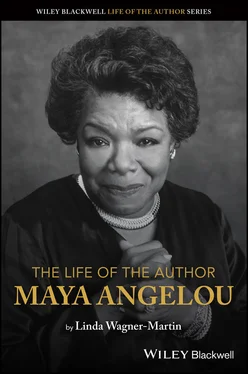Linda Wagner-Martin - The Life of the Author - Maya Angelou
Здесь есть возможность читать онлайн «Linda Wagner-Martin - The Life of the Author - Maya Angelou» — ознакомительный отрывок электронной книги совершенно бесплатно, а после прочтения отрывка купить полную версию. В некоторых случаях можно слушать аудио, скачать через торрент в формате fb2 и присутствует краткое содержание. Жанр: unrecognised, на английском языке. Описание произведения, (предисловие) а так же отзывы посетителей доступны на портале библиотеки ЛибКат.
- Название:The Life of the Author: Maya Angelou
- Автор:
- Жанр:
- Год:неизвестен
- ISBN:нет данных
- Рейтинг книги:4 / 5. Голосов: 1
-
Избранное:Добавить в избранное
- Отзывы:
-
Ваша оценка:
- 80
- 1
- 2
- 3
- 4
- 5
The Life of the Author: Maya Angelou: краткое содержание, описание и аннотация
Предлагаем к чтению аннотацию, описание, краткое содержание или предисловие (зависит от того, что написал сам автор книги «The Life of the Author: Maya Angelou»). Если вы не нашли необходимую информацию о книге — напишите в комментариях, мы постараемся отыскать её.
The Life of the Author: Maya Angelou
The Life of the Author: Maya Angelou
The Life of the Author: Maya Angelou — читать онлайн ознакомительный отрывок
Ниже представлен текст книги, разбитый по страницам. Система сохранения места последней прочитанной страницы, позволяет с удобством читать онлайн бесплатно книгу «The Life of the Author: Maya Angelou», без необходимости каждый раз заново искать на чём Вы остановились. Поставьте закладку, и сможете в любой момент перейти на страницу, на которой закончили чтение.
Интервал:
Закладка:
Psychiatrists today have paid much attention to the fact that traumatized people have to work diligently to construct their own narratives. Kali Tal insists that the kernel traumatic event is much less important than the way the victim rebuilds his or her psyche. Tal calls this process “mythologization” and finds that as a story is constructed, healing seems to occur. The story then becomes the “contained and predictable narrative.” The event itself has been ameliorated, if not erased. There is no need to compare the victim’s story with the actual event: all that matters is that the trauma victim feels in charge of whatever either happened or did not happen. She or he owns the process.
There is no question that trauma is trauma. But the health of the society – and of the traumatized person – depends on recovery. One of the complications in the retelling process is that there are several chronologies. The time frame of the event itself in real life might not parallel the time frame of the victim’s understanding of that event. Then the various tellings and re-tellings also occur at different stages in the victim’s life, and in the healing process. Some parts of the narrative appear immediately; others take years to surface. The victim is not necessarily repressing memory; she or he is unable to find it. Tal emphasizes that a traumatic event is not a normal happening. It exists somewhere in the victim’s liminal state so that the victim is, logically, “ungrounded.”
This is partly the reason Angelou recalls in her autobiography how frightened she was to be called to testify. Sitting before a courtroom filled with people, taking an oath on a Bible, swearing to tell the truth – these are not normal experiences for a seven-year-old child. Tal writes about the difficulty of “bearing witness.” She calls the act one of aggression , a starting point for a victim’s reclaiming of experience. “It is born out of a refusal to bow to outside pressure to revise or to repress experience, a decision to embrace conflict rather than conformity, to endure a lifetime of anger and pain rather than to submit to the seductive pull of revision and repression.” Angelou’s emphasis on how hard it was to look at Mr. Freeman is a kind of metaphor for how hard it was to be on the witness stand. She knew that the Baxters would have preferred she not testify. She knew that her doing so was yet another problem they would need to deal with themselves. She knew that being unable to speak in court would have been the easier way.
She self-disguises all this knowledge in her memoir, by seeing herself as disappointing God. She talks about damnation and the Devil. She does not acknowledge that it is the Baxter clan, which includes her mother, that she is disappointing. For a child who has no power, not to mention no place to live, such an act is beyond bravery. The resonance of Ritzie’s testimony echoes in her written expression of what she found so difficult in that hostile courtroom.
One can only speculate on what the Baxter family had decided about this grandchild. Her own intuition told her that she needed to preserve the relationship that kept her safe in St. Louis. There was no way Annie Henderson had the resources to come to St. Louis to find and retrieve her; there was no way her characteristically negligent father would be of any help. To stay alive, Marguerite had to tell a story that kept her (as much as possible) from any blame. The consequences of her giving her mother and her family reason to suspect that she herself had any guilt would be so horrific she would not be able to live.
In comparison with what Marguerite imagined would happen to her, the rape and recovery she had just experienced were nearly insignificant. She knew the Bible stories: she could imagine herself stoned to death as a “harlot.” She knew that, somehow and someway, she had disappointed her entire family. And if society disowned her, that family – including her beloved Bailey – would follow suit.
Having lived through the threats that Mr. Freeman would somehow kill her brother, threats that intensified with the actual rape, when he promised he would kill her, Marguerite was living in a wasteland of hopelessness. Never before in her life had anyone so much as punished her for doing anything. Now, in the sprawling city so far from Stamps and Momma, the threat of death was convincing. Ritzie’s imagination was not creating scenarios: it was working from the panorama of killings Mr. Freeman had warned her about. It was the first time in her life she had even heard such words.
To watchful eyes, Marguerite seemed to be living normally. The visiting nurse pronounced her healed. Back in Grandmother Baxter’s house, she gave in to her fearful need to be silent. At no time in her later autobiographies does she describe her behavior then from any external perspective. People cajoled her to speak, to talk to them. Nobody seemed to understand that her silence was a strategy of recovery. She herself was not sure she was recovering. What she knew was that she did not want to kill anyone, not even Mr. Freeman.
According to Angelou’s narrative about the rape, the trial, and the death of Mr. Freeman, the unkindest behavior of all came from Grandmother Baxter. The day after the trial, when the immense white sheriff brought the news of Mr. Freeman’s murder to the house, Grandmother Baxter murmured through the story “Poor man.” Sympathizing with the fate that had befallen him, she kept a tight rein on her emotions, knowing well that Bailey and Ritzie could hear the conversation. After the door closed, she announced to them that they should go to their rooms, saying “You didn’t hear a thing. I never want to hear this situation or that evil man’s name mentioned in my house again. I mean that.” 2
So much for working through trauma. So much for finding the words to reconstruct a story. So much for understanding that trauma was never a single debilitating act. As Marguerite lived her silent life in St. Louis, the Baxter family grew more and more upset with her behavior: they told her to be “normal.” They threatened her. Finally, their patience shredded with the town’s attention, the Baxters began physically punishing her. Angelou writes only one sentence about the various “thrashings” she is given by numerous family members. She does not elaborate further on what her life in Grandmother Baxter’s house has become.
Whether or not Annie Henderson suggested that the children come back to Stamps, or whether Grandmother Baxter thought the two were just plain difficult and not worth her attention, Bailey, Jr. and Ritzie found themselves on a train headed to Arkansas. This time they were less fearful, though Bailey cried surreptitiously for the loss of his beloved “Mother Dear.” They were generally pleased to be returning to what now seemed an entirely safe place – both geographically and emotionally – and a useful harbor for their lives as they grew through elementary and middle school. As it all turned out, they would not leave Stamps again until Marguerite had graduated from the eighth grade.
Notes
1 1 Angelou, Collected Autobiographies, p. 70.
2 2 Angelou, Collected Autobiographies, p. 70.
3 Recovery in Arkansas
Being silent in Stamps was nobody’s business. Momma saw to it that whatever Ritzie did was acceptable. The girl spoke occasionally through Bailey; she sometimes sang in church; she “taught” her friends new songs she had written through Bailey’s helping them; she found ways to communicate non-verbally. But by and large Ritzie was a different child than she had been the year before.
She remained dutiful. She slept each night with Momma. Then she got up and ate breakfast. She dressed neatly. Then, with Bailey, she walked up the path to school. For the first time, she and Bailey were in the same room, since one teacher taught three grades simultaneously. The rivalry that had always bound the brother and sister still existed, but Ritzie was surprised how often she could beat her brother.
Читать дальшеИнтервал:
Закладка:
Похожие книги на «The Life of the Author: Maya Angelou»
Представляем Вашему вниманию похожие книги на «The Life of the Author: Maya Angelou» списком для выбора. Мы отобрали схожую по названию и смыслу литературу в надежде предоставить читателям больше вариантов отыскать новые, интересные, ещё непрочитанные произведения.
Обсуждение, отзывы о книге «The Life of the Author: Maya Angelou» и просто собственные мнения читателей. Оставьте ваши комментарии, напишите, что Вы думаете о произведении, его смысле или главных героях. Укажите что конкретно понравилось, а что нет, и почему Вы так считаете.












